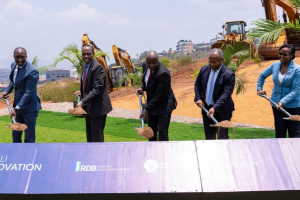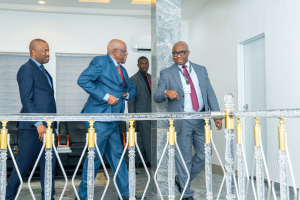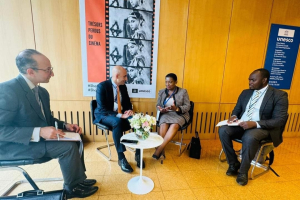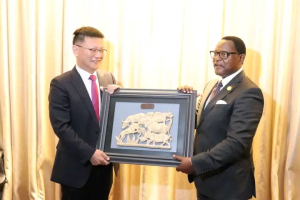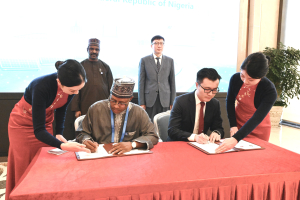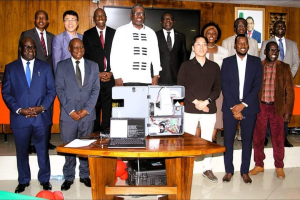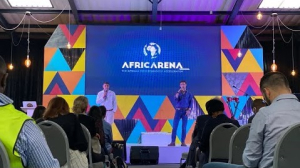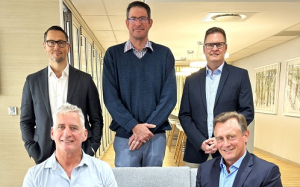Rwanda Launches Kigali Innovation City to Drive Technological Development
Establishing innovation hubs and fostering tech education drives entrepreneurship by empowering individuals to create localized solutions to pressing challenges. This approach enables African nations to develop indigenous technologies in sectors such as agriculture, healthcare, and education, decreasing their dependence on foreign innovations.
The Rwandan government, led by Prime Minister Dr. Edouard Ngirente, has inaugurated the construction phase of the Kigali Innovation City (KIC), a major initiative aimed at advancing technological innovation in Rwanda. The groundbreaking ceremony took place on September 10 in Kigali’s Special Economic Zone, Gasabo District.
"Kigali Innovation City is more than just infrastructure; it is an ecosystem designed to promote innovation, attract top talent, and drive investment," Dr. Ngirente emphasized. He added that KIC aligns with Rwanda's vision of a prosperous, tech-driven future for the nation and the African continent.
Rwanda’s ICT and Innovation Minister, Paula Ingabire Musoni, underscored the importance of KIC as a catalyst for tech investment. She described KIC as a platform where multinational companies and startups can collaborate on solutions that will shape Rwanda's future technology agenda.
The KIC project, a 61-hectare smart city worth over $ 2 billion, is a master-planned city designed to create a hub for technological innovation. It will include universities, startup incubators, office spaces, and supporting facilities such as retail and hospitality services. Pioneering Infrastructure investor and asset manager Africas50, backed by African global capital, was granted exclusive rights by the Rwandan Government to develop, operate, and commercialize the city.
The project is expected to generate $150 million in annual ICT exports and attract over $300 million in foreign direct investment. The city is also projected to create more than 50,000 jobs upon completion and produce over 2,600 tech graduates annually, bolstering Rwanda's tech ecosystem.
This initiative aligns with government-led programs like the Smart Rwanda Master Plan, which aims to transform the nation into a knowledge-driven economy, and the One Laptop Per Child initiative designed to empower the population with digital literacy. By increasing digital proficiency, Rwanda can enhance the workforce available to innovation hubs like Kigali Innovation City (KIC), encouraging entrepreneurship and the creation of technology solutions that address African challenges. In the long run, this will cultivate a thriving innovation ecosystem, strengthen Rwanda's position as a continental tech leader, and contribute to bridging the digital divide, fostering sustainable growth, and advancing Africa’s global technological presence.
The ICT sector in Rwanda has grown steadily over the years. According to the Rwanda Development Bank’s ICT Skills Snapshot 2022, the sector contributed 2% of GDP and employed around 8,962 workers (0.26% of employment) as of 2020. The government targets a higher contribution through its Digital Transformation Strategy and projects like KIC.
Hikmatu Bilali
Data Protection: Somali Authority Visits Abuja to Gain Nigerian Expertise
In an era where data is a valuable resource, public trust in government and private sector data handling is essential. Building effective data protection frameworks enhances transparency and accountability, which are vital for increasing citizen engagement in digital services and governance.
The Nigeria Data Protection Commission (NDPC) recently welcomed a delegation from Somalia's Data Protection Authority on a study tour, NDPC announced on September 3. The delegation aims to explore Nigeria’s data protection ecosystem and learn from its innovative models.
National Commissioner and CEO of the NDPC Vincent Olatunji emphasized the growing importance of independent data protection authorities in the digital era. He also highlighted the Public-Private Partnership (PPP) model adopted by the NDPC and outlined the commission's strategic roadmap for strengthening data privacy and protection in Nigeria.
The study tour covered a wide range of topics, including Nigeria's data protection laws, enforcement mechanisms, compliance frameworks, and efforts to raise public awareness of the importance of data security.
The Somali Ambassador underscored the need for knowledge exchange between the two nations. He noted Somalia's keen interest in learning from Nigeria’s experiences in data protection, particularly in legislation, enforcement, and compliance.
Somalia's digital ecosystem, while still in early development, is gradually advancing, with efforts like the Somalia Data Protection Act of 2023 which came into effect on March 23, 2023, with the signing of Law No. 005 of 2023 to fill critical regulatory gaps.
This initiative aligns with the country's growing focus on data governance and is a significant step in its digital transformation. It will play a key role in enhancing digital literacy, governance, and engagement in global digital markets.
Hikmatu Bilali
Zambia Partners with Egypt and Malaysia to Boost Digital Education
Africa has the youngest population in the world, with nearly 60% of its people under 25. Investing in educational technology and equipping young Africans with digital skills are essential for the future workforce. This guarantees that they will become prepared for jobs in the new economy.
Zambia has sought collaboration with Egypt and Malaysia to integrate digital technology into its education system nationwide, announced a press release dated September 4. This was during a Bilateral meeting with Egypt's Minister of Education, Mohamed Abdel Latif, on the sidelines of UNESCO's Digital Learning Week in Paris.
Ministry of Education Permanent Secretary, Noriana Muneku, emphasized Zambia's political commitment, saying: “It’s important to leverage partnerships with countries like Egypt, which have successfully navigated similar challenges. As Zambia prepares to pilot educational technology initiatives alongside five other countries under the Southern African Development Community, this collaboration is timely.”
In a separate meeting, Muneku also engaged Malaysia's Minister of Education, Fadhlina Sidek, outlining Zambia's interest in forming a meaningful partnership to further integrate technology into schools.
Recognizing the need for digital transformation in various strategic sectors, Zambia has launched the National Digital Transformation Strategy 2023–2027. In the education sector, several initiatives aim to enhance digital literacy and skills across all levels. The government has introduced an ICT curriculum in secondary schools to develop citizens' skills and capacity. Additionally, a center of excellence has been established at the Zambia University of Technology to support the growth of ICT professionals.
Many higher education institutions now offer ICT-related training, and the ICT Association of Zambia (ICTAZ) was created to regulate the conduct of ICT professionals. Digital equipment has also been introduced in some schools.
This development is seen as a crucial step toward modernizing Zambia's education system and enhancing digital literacy among students.
Hikmatu Bilali
South Africa: Cape Town to Host Afrilabs Annual Gathering in November 2024
From November 6-8, 2024, Cape Town will host Africa's leading innovation conference, the Afrilabs Annual Gathering. The gathering is a hub for Africa’s innovation community to come together, collaborate, and advance the continent’s digital transformation.
The event will feature six tracks on critical innovation topics, with over 50 thought leaders sharing their insights and more than 20 panels highlighting groundbreaking ideas.
Malawi Government to Launch 'Smart Village Initiative' with Huawei
Enhanced digital access in rural areas fosters economic opportunities by connecting communities to markets, information, and services that were previously out of reach. This can lead to improved agricultural practices through smart farming technologies, better education and healthcare services, and greater access to financial services.
The Government of Malawi has announced plans to launch a "Smart Village Initiative" in partnership with Huawei Technologies. This initiative aims to bring digital transformation to rural areas across the country.
President Lazarus Chakwera revealed the plan on September 3, on the sidelines of the Summit of the Forum on China-Africa Cooperation (FOCAC) being held from September 4-6 in Beijing. He emphasized that the initiative would include establishing technical training centers in rural areas to equip youth with essential digital skills, such as AI, cybersecurity, and smart agriculture solutions, which are vital for supporting large-scale farming initiatives.
The Smart Village Blueprint, conceived as a practical tool to improve Internet access in rural and remote areas, will be the foundation of this project. The Smart Villages project adopts a locally led, integrated approach to providing digital services to all rural citizens. By integrating digital technologies, the initiative aims to deliver equitable, high-quality, and efficient services related to the Sustainable Development Goals (SDGs) for all.
Huawei has been instrumental in transforming rural and urban areas across Africa through its smart village and city initiatives. In July, the company partnered with Zambia to launch a smart village in Namwala, enhancing connectivity and digital access in rural communities. Huawei also recently signed an agreement with Kaduna State, Nigeria, to develop a smart city project, integrating advanced technologies like AI and IoT to improve public safety and transportation.
This initiative aligns with the Malawi 2063 (MW2063) agenda, which envisions transforming Malawi into an industrialized upper-middle-income country by 2063. It builds on a series of successful collaborations between Malawi and Huawei, including the 2022 launch of the country’s first-ever National Data Center, a key milestone in advancing Malawi's digital infrastructure.
Hikmatu Bilali
Nigeria: Kaduna State Partners with Huawei on a Smart City Project
Africa's cities are facing rapid population growth. Providing millions of people with an adequate living environment requires more targeted investment. The integration of ICTs into urban policies should no longer be overlooked.
Kaduna State Governor Uba Sani and Chris Lu, the CEO of Huawei Technologies Nigeria Limited, have signed a Memorandum of Understanding (MoU) for the Kaduna State Smart City Project. The ceremony which took place at Huawei’s office in Beijing, yesterday September 2, was attended by Nigeria’s President, H.E. Bola Ahmed Tinubu.
Governor Uba Sani explains that“ this project holds the key to a more secure and prosperous Kaduna State.” It will focus on several key areas, including the establishment of a State-Level Unified Command Center, which will centralize and improve security operations. It will also introduce advanced Intelligent Traffic Management systems to optimize transportation within the state. E-Government and Office Automation will streamline administrative processes, while Smart Education and Healthcare initiatives aim to elevate public services.
Additionally, the project will promote ICT Talent Development and integrate Renewable Energy solutions to support sustainable development. Public Transportation will also be enhanced through advanced technology. To ensure the project's success, Kaduna State and Huawei will establish a joint committee to finalize the implementation plan, funding arrangement, and technology deployment.
The UN Department of Economic and Social Affairs (DESA) reports that Nigeria is experiencing rapid urbanization, with more than half of its 213 million population now residing in urban areas. Currently, 53% of Nigerians live in cities, and this figure is expected to exceed 70% by 2050, presenting various challenges. Smart cities could provide effective solutions for managing this urban growth by optimizing resources and services.
Hikmatu Bilali
University of Zambia Partners with South Korea to Fight Malaria with AI
Malaria remains one of Africa’s most pressing public health issues, accounting for over 90% of global malaria cases and deaths. Leveraging AI to enhance prevention, detection, and treatment can drastically reduce the disease’s burden, saving lives and improving health outcomes.
The University of Zambia (UNZA) and the Convergence Research Centre for Insect Vectors (CRCIV) of South Korea have signed an agreement to advance malaria research using artificial intelligence (AI). The partnership, signed on August 30, will establish a Research Center of Excellence at UNZA’s School of Engineering, focusing on preventing malaria outbreaks through AI technology.
For UNZA Acting Vice Chancellor, Professor Bornface Namangala, the partnership marks the beginning of a transformative effort to tackle malaria, a leading cause of death in Zambia.
SMART Zambia National Coordinator, Percy Chinyama, praised the collaboration, noting that the center could serve as a learning platform and help institutionalize AI in Zambia.
The initiative will leverage cutting-edge AI technology to identify mosquito species and combat malaria. An AI-powered system will be deployed to collect and accurately classify mosquito species, enhancing the precision of malaria prevention efforts. This project has garnered strong support from the government.
According to the U.S. President’s Malaria Initiative (PMI), which aids sub-Saharan African countries in controlling and eliminating malaria, Zambia remains highly endemic, with the entire population at risk. In 2022, the National Malaria Elimination Centre (NMEC) reported over 8.4 million cases, an incidence rate of 428 per 1,000 people annually, and 1,337 malaria-related deaths, equating to 8 deaths per 100,000 people.
This initiative aligns with Zambia’s National Malaria Monitoring and Evaluation (M&E) Plan 2022-2026, which outlines a framework for tracking malaria program indicators, data sources, analysis, information flow, reporting, and feedback for informed decision-making. It directly supports the plan’s goal of improving data-driven decision-making and achieving better health outcomes.
Hikmatu Bilali
AfricArena Summit to Highlight Climate Tech and Boost Kenya’s Tech Growth
Nairobi, Africa’s Silicon Savannah, will host the AfricArena Nairobi Summit during Africa Climate Tech Week from September 3-4, 2024.
We’re heading to Kenya! 🇰🇪 Excited to announce the AfricArena Nairobi Summit from Sept 1-4, focusing on Climate Tech in Africa! 🌍
— AfricArena (@AFRICARENA) July 15, 2024
This summit will bring together investors, startups, and policymakers to advance Climate Tech in Africa.
🔗https://t.co/rGN8PJAEki🌱#ClimateTech pic.twitter.com/3MJeD6RMAc
The event will highlight over 20 top climate tech and green economy startups, showcasing innovations and reinforcing Nairobi’s role as a key driver in Africa’s tech and investment scene.
The summit will feature startups like Aquarech, RHEA Soil Health, and iShamba Limited, along with 6 Korean startups expanding into Africa.
Omnisient Secures $7.5M Series A Funding from Arise to Expand Data Platform
Omnisient, a South African startup focused on privacy-preserving data collaboration, has raised $7.5 million in Series A funding from Arise, an investor in African financial service providers and fintechs. The startup announced the funding on August 27.
The investment will fuel Omnisient’s expansion into markets in Africa, the UK, the US and the Middle East. It will also allow Omnisient to partner with larger data providers, expanding financial services access globally.
AfriLabs Invites Nigerian Innovators to Paris Summit from October 9-11
AfriLabs invites Nigerian tech innovators and entrepreneurs to an exclusive, self-funded trip to Paris from October 9th to 11th, 2024. This trip offers a chance to secure investment, gain industry insights through 500+ workshops and conferences, and participate in 33,500 business meetings.
It is also a platform to showcase Nigerian innovations on a global stage. The program is open to hubs, entrepreneurs, and key players in Nigeria's tech ecosystem.
Registration closes by September 7.


